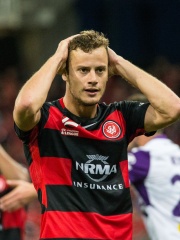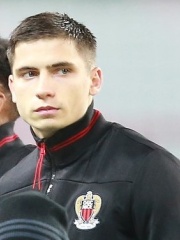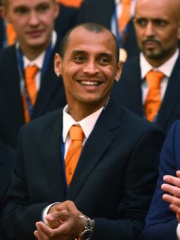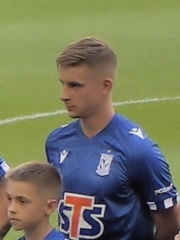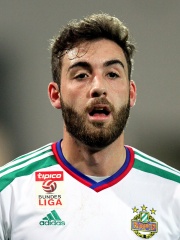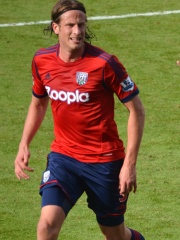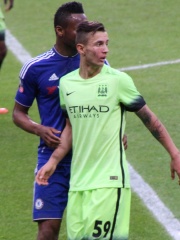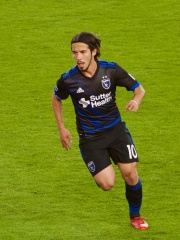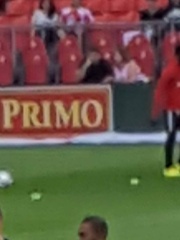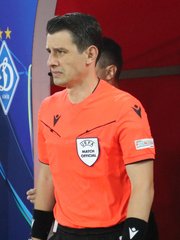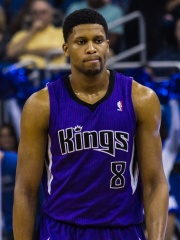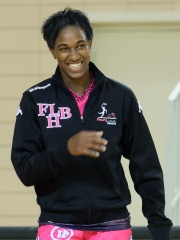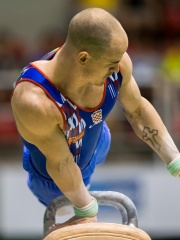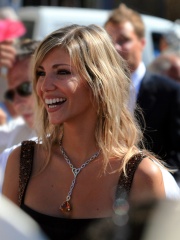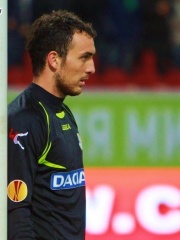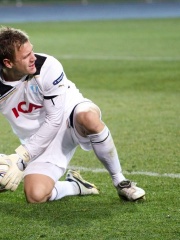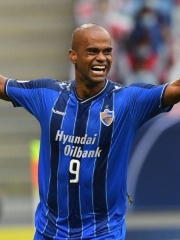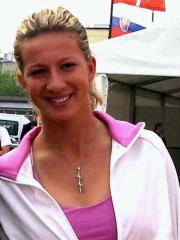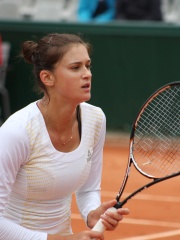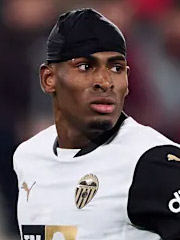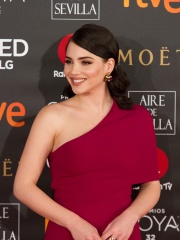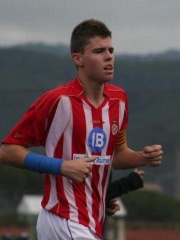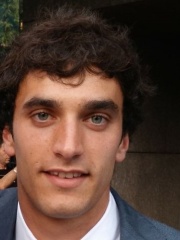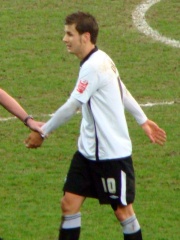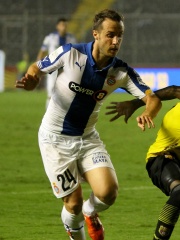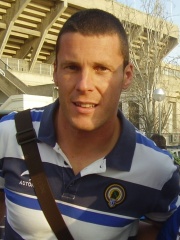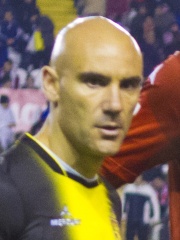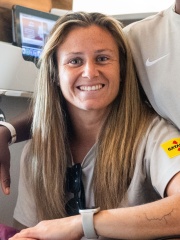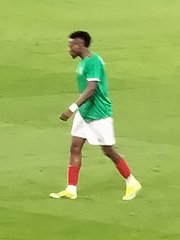Soccer Player
Oriol Riera
1986 - today
EN.WIKIPEDIA PAGE VIEWS (PV)
 Oriol Riera
Oriol Riera
His biography is available in 21 different languages on Wikipedia. Oriol Riera is the 14,378th most popular soccer player (down from 13,121st in 2024), the 3,123rd most popular biography from Spain (down from 2,943rd in 2019) and the 885th most popular Spanish Soccer Player.
Memorability Metrics
Page views of Oriol Riera by language
Among Soccer Players
Among soccer players, Oriol Riera ranks 14,378 out of 21,273. Before him are Romain Perraud, Alan Patrick, Sergio Corino, Pathé Ciss, Michał Skóraś, and Ben Brereton Díaz. After him are Thanos Petsos, Jonas Olsson, Marcelo Vega, Bersant Celina, Jahmir Hyka, and Robin Fraser.
Most Popular Soccer Players in Wikipedia
Go to all RankingsRomain Perraud
1997 - Present
HPI: 40.17
Rank: 14,385
Alan Patrick
1991 - Present
HPI: 40.17
Rank: 14,386
Sergio Corino
1974 - Present
HPI: 40.16
Rank: 14,387
Pathé Ciss
1994 - Present
HPI: 40.16
Rank: 14,388
Michał Skóraś
2000 - Present
HPI: 40.16
Rank: 14,389
Ben Brereton Díaz
1999 - Present
HPI: 40.16
Rank: 14,390
Oriol Riera
1986 - Present
HPI: 40.16
Rank: 14,391
Thanos Petsos
1991 - Present
HPI: 40.16
Rank: 14,392
Jonas Olsson
1983 - Present
HPI: 40.16
Rank: 14,393
Marcelo Vega
1971 - Present
HPI: 40.16
Rank: 14,394
Bersant Celina
1996 - Present
HPI: 40.15
Rank: 14,395
Jahmir Hyka
1988 - Present
HPI: 40.15
Rank: 14,396
Robin Fraser
1966 - Present
HPI: 40.15
Rank: 14,397
Contemporaries
Among people born in 1986, Oriol Riera ranks 1,012. Before him are Halil Umut Meler, Rudy Gay, Alexandrina Cabral, Filip Ude, Mario Rondón, and Bae Seul-ki. After him are Alexandra Rosenfeld, Željko Brkić, Johan Dahlin, Júnior Negrão, Marta Domachowska, and Irina Buryachok.
Others Born in 1986
Go to all RankingsHalil Umut Meler
REFEREE
1986 - Present
HPI: 40.23
Rank: 1,006
Rudy Gay
BASKETBALL PLAYER
1986 - Present
HPI: 40.22
Rank: 1,007
Alexandrina Cabral
HANDBALL PLAYER
1986 - Present
HPI: 40.22
Rank: 1,008
Filip Ude
GYMNAST
1986 - Present
HPI: 40.21
Rank: 1,009
Mario Rondón
SOCCER PLAYER
1986 - Present
HPI: 40.19
Rank: 1,010
Bae Seul-ki
SINGER
1986 - Present
HPI: 40.17
Rank: 1,011
Oriol Riera
SOCCER PLAYER
1986 - Present
HPI: 40.16
Rank: 1,012
Alexandra Rosenfeld
CELEBRITY
1986 - Present
HPI: 40.16
Rank: 1,013
Željko Brkić
SOCCER PLAYER
1986 - Present
HPI: 40.15
Rank: 1,014
Johan Dahlin
SOCCER PLAYER
1986 - Present
HPI: 40.14
Rank: 1,015
Júnior Negrão
SOCCER PLAYER
1986 - Present
HPI: 40.14
Rank: 1,016
Marta Domachowska
TENNIS PLAYER
1986 - Present
HPI: 40.13
Rank: 1,017
Irina Buryachok
TENNIS PLAYER
1986 - Present
HPI: 40.13
Rank: 1,018
In Spain
Among people born in Spain, Oriol Riera ranks 3,123 out of NaN. Before him are Julio Rey (1972), Cristhian Mosquera (2004), Marina Salas (1988), David Meca (1974), Andrea Duro (1991), and Sergio Corino (1974). After him are David Civera (1979), David Fernández Borbalán (1973), Gerard Gumbau (1994), Iñigo Lekue (1993), Andrea Orlandi (1984), and Ismael Serrano (1974).
Others born in Spain
Go to all RankingsJulio Rey
ATHLETE
1972 - Present
HPI: 40.20
Rank: 3,117
Cristhian Mosquera
SOCCER PLAYER
2004 - Present
HPI: 40.20
Rank: 3,118
Marina Salas
ACTOR
1988 - Present
HPI: 40.19
Rank: 3,119
David Meca
SWIMMER
1974 - Present
HPI: 40.17
Rank: 3,120
Andrea Duro
ACTOR
1991 - Present
HPI: 40.17
Rank: 3,121
Sergio Corino
SOCCER PLAYER
1974 - Present
HPI: 40.16
Rank: 3,122
Oriol Riera
SOCCER PLAYER
1986 - Present
HPI: 40.16
Rank: 3,123
David Civera
SINGER
1979 - Present
HPI: 40.15
Rank: 3,124
David Fernández Borbalán
REFEREE
1973 - Present
HPI: 40.14
Rank: 3,125
Gerard Gumbau
SOCCER PLAYER
1994 - Present
HPI: 40.13
Rank: 3,126
Iñigo Lekue
SOCCER PLAYER
1993 - Present
HPI: 40.13
Rank: 3,127
Andrea Orlandi
SOCCER PLAYER
1984 - Present
HPI: 40.13
Rank: 3,128
Ismael Serrano
MUSICIAN
1974 - Present
HPI: 40.12
Rank: 3,129
Among Soccer Players In Spain
Among soccer players born in Spain, Oriol Riera ranks 885. Before him are Francisco Montañés (1986), Juan Calatayud (1979), José María Movilla (1975), Melli (1984), Cristhian Mosquera (2004), and Sergio Corino (1974). After him are Gerard Gumbau (1994), Iñigo Lekue (1993), Andrea Orlandi (1984), Rodrigo Zalazar (1999), Sandra Paños (1992), and Álvaro Djaló (1999).
Francisco Montañés
1986 - Present
HPI: 40.24
Rank: 879
Juan Calatayud
1979 - Present
HPI: 40.22
Rank: 880
José María Movilla
1975 - Present
HPI: 40.21
Rank: 881
Melli
1984 - Present
HPI: 40.21
Rank: 882
Cristhian Mosquera
2004 - Present
HPI: 40.20
Rank: 883
Sergio Corino
1974 - Present
HPI: 40.16
Rank: 884
Oriol Riera
1986 - Present
HPI: 40.16
Rank: 885
Gerard Gumbau
1994 - Present
HPI: 40.13
Rank: 886
Iñigo Lekue
1993 - Present
HPI: 40.13
Rank: 887
Andrea Orlandi
1984 - Present
HPI: 40.13
Rank: 888
Rodrigo Zalazar
1999 - Present
HPI: 40.11
Rank: 889
Sandra Paños
1992 - Present
HPI: 40.09
Rank: 890
Álvaro Djaló
1999 - Present
HPI: 40.07
Rank: 891
